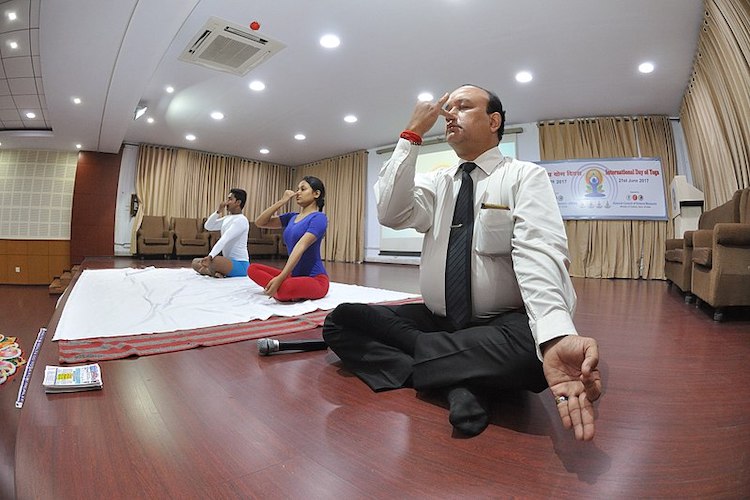6 Actionable Ways To Manage Stress
Stress has always been part of the human condition. In our distant past, stress meant it was time to move—time to find food, water, or shelter. Or time to run from something trying to eat you. As soon as the need was met or we successfully escaped death, the stress went away until it was time to start working again.
In modern society, stress for many people has become chronic. Most of us don’t have to worry about food, water, and shelter, but we stress about paying bills, finding a mate, what our boss thinks of us, deadlines we have to meet, how many social media followers we have, and so on. These things are constant thoughts in our minds. Turn on the news at any given time and you’ll be bombarded with stressful situations that, in all reality, you can’t do much about.
This chronic stress is incredibly damaging. It causes the body to produce an overabundance of stress hormones (such as cortisol) which can cause weight gain, immune system suppression, sexual dysfunction, constant exhaustion, and a host of other problems.
When your mind tells your body it’s stressed, it prepares to move. It causes muscles to tense in preparation for whatever’s coming and increases heart rate to get your blood pumping. Because your bills are always coming up and you never truly escape from your deadlines, your body never gets that moment of relaxation.
Stress in and of itself is not necessarily a bad thing. It can be extremely helpful if used correctly. When you exercise, you stress your muscles into becoming stronger to accommodate more weight. When you study calculus, you stress your neurons so that they learn to fire in new ways. Nothing can grow without pressure, but too much pressure crushes everything. Luckily, if you know your mind is the software driving all bodily functions, then you can find ways to “hack” the system.

Take Up Meditation
Meditation is to your mind what exercise is to your body. It teaches the brain, which for most of us is constantly running, to focus on the present moment and let go of all the thoughts banging around in your head. When your mind is not focusing on the stressful things in life, your body can relax. Muscles can release, and production of stress hormones can go down.
The problem with meditation is that it takes time to master. It sounds easy to sit down and think about nothing, but most people find it incredibly difficult at the beginning. By sitting still and focusing only on your breath, your mind inevitably starts to race. It reminds of you of appointments you have days from now, that your computer desk needs to be cleaned, and that you should call your mom.
They key is to gently direct your mind back to the breath whenever you start to notice it going off on a tangent. This will happen again and again, and your job is just to refocus on the breath. Eventually, with a ton of practice, you’ll learn to still your mind when you want to. And when you begin to feel stressed or emotional, you’ll be able to separate yourself, focus on your breathing, and go through life in a more relaxed way.
There are hundreds of ways to meditate, and different techniques work for different people. You can try an app like Headspace, take a Transcendental Meditation course, or just sit quietly for 30 minutes a day and try to focus on your breath for long stretches of time.

Enjoy Yourself
We live in a society that idolizes the struggle of the workaholic. We love to work overtime, grind it out, and stay “productive.” We cram our schedules full of things to do and wonder why we’re too exhausted to play fetch with the dog or go out with friends at the end of a day.
In reality, having fun and enjoying your life is just as important as making it productive. Laughing produces feel-good hormones that reduce the impacts of stress on the body. When we are in states of enjoyment, we naturally focus on the moment and forget the things that are bothering us.
So, pepper some fun in among your daily duties—it’s the most underrated part of life these days.

Try Heart Math
This is where hacking your biology gets serious. Heart Math is a company that uses heart rate variability to give you an idea of your inner state. You can buy a device that measures your heart rate variability and alerts you when you’re too stressed. You can choose to meditate, listen to music, or do anything that gets you back into a balanced state.
People have noticed amazing results from using this technology. You’ll be astonished at how much you don’t notice your own stress levels day to day. Like anything else, if you practice reducing your heart rate variability often, it will become easier and easier to do.

Use Neurofeedback
Neurofeedback is the ultimate hack for retraining your brain to combat stress. Using electrical sensors placed on your head, you can get a reading of your own brainwave activity as you respond to stressors in your life. This is called an EEG (electroencephalogram).
If you go to a professional neurofeedback therapist, he or she will provide a series of training sessions meant to teach your central nervous system to better regulate your brainwave frequencies. It is not a cure for stress, but rather a way of managing it so that it does not become chronic and cause health problems. You can also buy an EEG machine for in-home use and research how to retrain your brain yourself.

Do Yogic Breathing Exercises
The actual name for the art of yogic breathing is Pranayama. Prana is the Sanskrit word for life-force or life-breath and focuses mainly on belly breathing. When we breathe from our chests, the breathing is shallow and not much oxygen reaches the lungs. This is the way we breathe when we’re emotional or stressed.
Pranayama emphasizes focusing on pulling air into the nose and allowing only the belly to swell with the breath—not the chest or shoulders. When practicing, you should inhale slowly and fill the stomach as much as possible, hold for a moment, exhale slowly with control, and then pause again before repeating the cycle.
Doing this ancient yoga technique when you’re feeling emotional or stressed helps refocus your mind and brings more oxygen to the brain. It works along with meditation and can be done anywhere. So, the next time you find your mind racing with all the things you have to do, focus on your belly-breath and watch the stress melt away.

Check Out The Art Of Living Foundation
If you know stress is a problem in your life but you’re unsure how to deal with it properly, it’s often best to turn to the experts. The Art of Living Foundation is a collection of people dedicated to helping the world resolve stress and live happier, more peaceful lives.
They provide courses on how to use time-honored techniques to reduce anxiety, depression, and stress in our modern world. It was founded by a spiritual teacher, but you don’t have to be a monk to reap the benefits of the foundation’s workshops and online courses. In fact, they’re now offered in over 200 countries worldwide.
If you’re still feeling lost after reading this list, go to their website and try the free introductory course. Thousands of people have learned to hack their minds and live happier, healthier lives, and you can, too.
It may seem like we have less to worry about today than ever before in human history. We have all the food we need. There are no saber-toothed tigers hunting us down. Life should be good. But with the constant pressure of modern life to work harder, earn more, and stay productive, our stress has become chronic and is wreaking havoc on our bodily systems.
Thankfully, modern life has also provided the tools we need to stay relaxed and healthy. So, go meditate, do some breathing exercises, play with your dog—whatever you need to do to get that monkey off your back and put a smile on your face.
